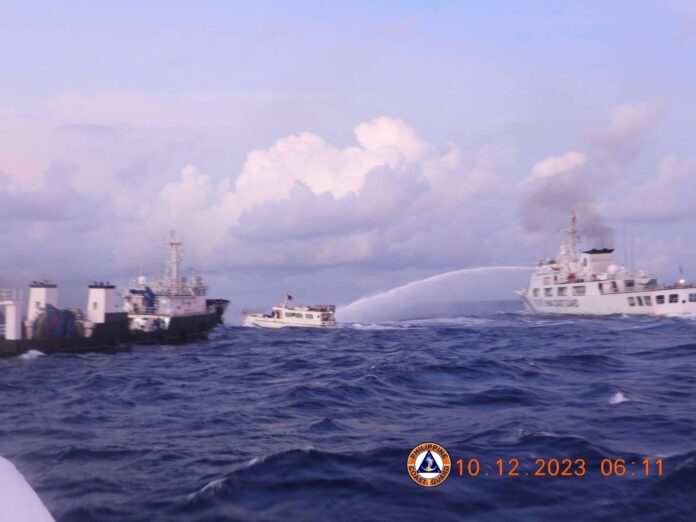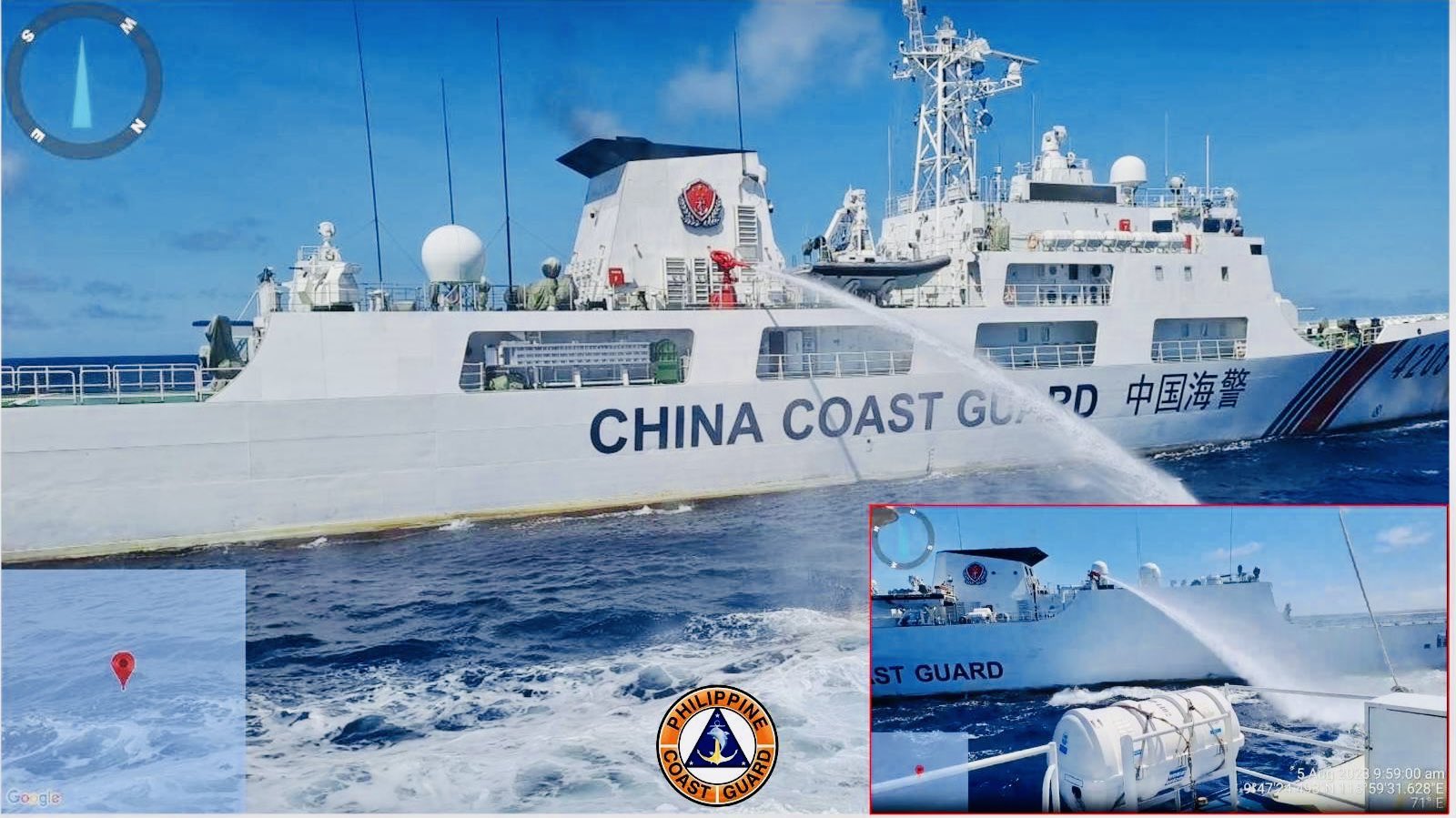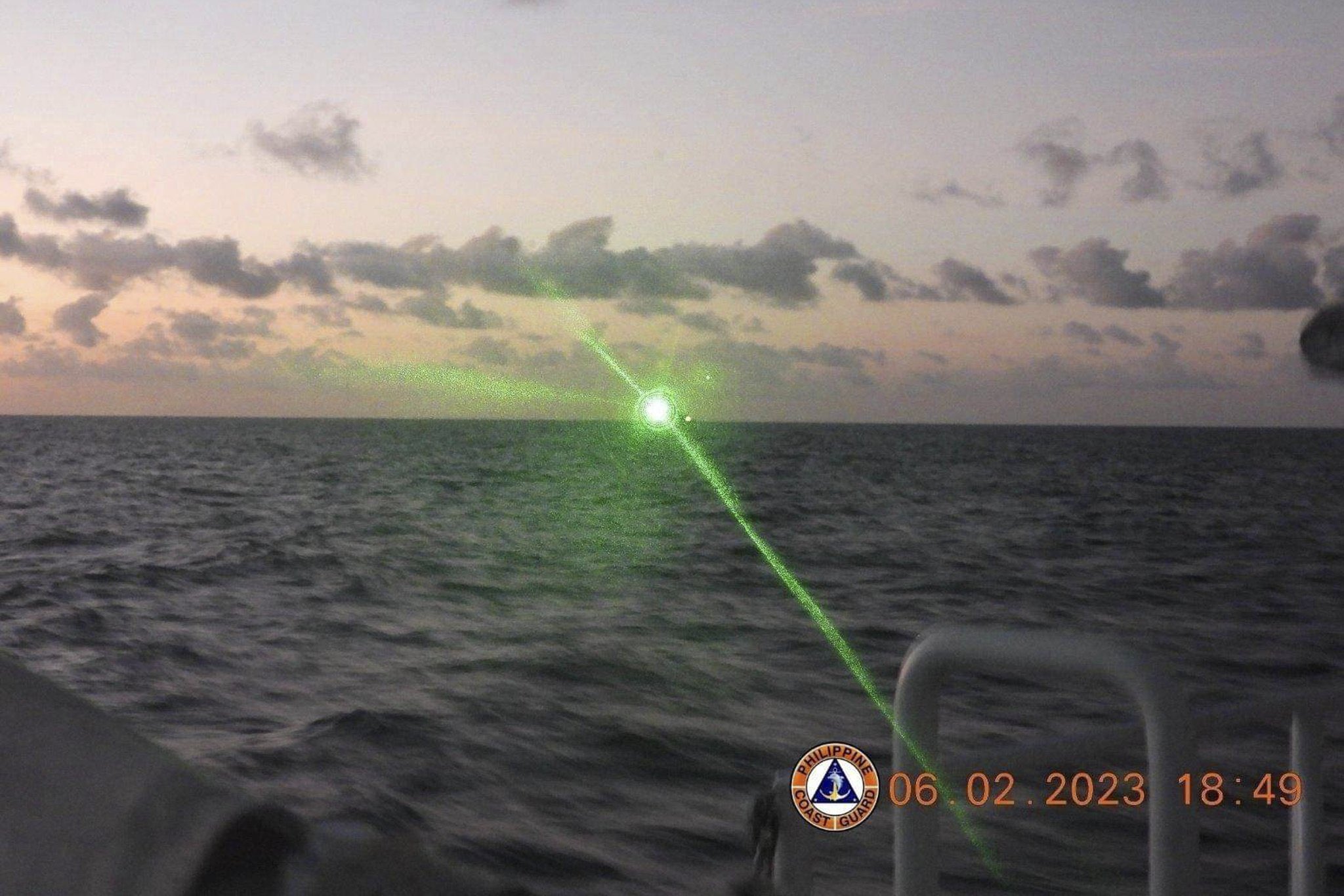
THE CHINA Coast Guard continues to harass Filipino vessels within the Philippine Exclusive Economic Zone (EEZ), raising concerns over escalating tensions triggered by Beijing’s provocative actions.
The latest provocation came on Sunday, Dec. 10, when the Chinese Coast Guard rammed and used water cannons to prevent Philippine vessels en route to Bajo de Masinloc from conducting a routine resupply mission, according to videos posted by the Philippine Coast Guard (PCG) on X, formerly Twitter.
Statement of the National Task Force-West Philippine Sea
December 10, 2023, Manila, PhilippinesToday, 10 December 2023, China Coast Guard (CCG) and Chinese Maritime Militia (CMM) vessels harassed, blocked, and executed dangerous maneuvers on Philippine civilian supply vessels,… pic.twitter.com/NF66BqVPUM
— Jay Tarriela (@jaytaryela) December 10, 2023
President Marcos on Sunday condemned the aggression, saying it “further steeled” the country’s “determination to protect our nation’s sovereignty” in the contested waters.
“We remain undeterred,” Marcos said in a statement.
In interviews with the Varsitarian before the water cannon incident, experts observed that the Philippines was placed in a precarious position ever since it became more assertive of its territorial rights backed by its 2016 victory in the Hague and drew back closer to its longtime ally, the United States (US), after years of appeasing China.
“Sino-Philippine relations are currently at a deadlock with respect to the territorial and maritime disputes, but the Philippine position is in the correct position of standing up for its rights and entitlements against China’s excessive and unfounded claims,” Jay Batongbacal, the director of the Institute for Maritime Affairs and Law of the Sea of the University of the Philippines (UP) Law Center, said.
Clashes between China and the Philippines have increased this year. The Chinese military has used military-grade lasers and long-range acoustic devices that caused temporary blindness and impaired hearing in Filipino crew members and shadowed over small vessels that ended up with minor collisions, all in the name of defending its sovereignty.
And in a reversal of previous foreign policy, Marcos noticeably mended the country’s frayed relationship with the US after his predecessor, Rodrigo Duterte, cozied up with Beijing.
“We are facing new challenges and I couldn’t think of a better partner to have than you,” US President Joe Biden told Marcos in May when the latter visited the White House. “The US also remains ironclad in our commitment to the defense of the Philippines, including in the South China Sea, and we will continue to support the Philippines military modernization.”
In response, China had repeatedly accused the US of stirring up tensions in the contested waters to divide countries. “The US instigated and emboldened the Philippine side to infringe upon China’s sovereignty, which escalated maritime tensions,” said China’s Defense Ministry spokesperson Wu Qian in November. “The US is not a party involved and its interference will only make things worse.”
Leaning to China has not been a good approach, however.
Research by Prof. Renato de Castro of the Department of International Studies at the De La Salle University concluded that the Duterte administration reluctantly shifted its approach to China from appeasement to “limited hard balancing,” which is employed by some countries that failed to counter a competitor’s strategies by embarking on semi-formal partnerships, as the superpower reneged on its promises to invest in the government’s signature Build, Build, Build program and allow increased naval presence in WPS’s artificial islands.
Jonathan Malaya, the assistant director general of the National Security Council, admitted that the Duterte-era strategy was fruitless but continues to be a guide for Marcos to avoid repeating any mistakes.
“I think ‘yong experience natin under Pangulong Duterte informed the decision-making right now,” Malaya said. “Kasi nung panahon [niya], we tried to engage with China very closely, at wala naman tayo masyadong napala.”
“Having learned from that experience, President Marcos said na, ‘You know, we will continue talking.’ Kausap niya lang si Xi Jinping sa San Francisco, pero we will not be bullied.”


‘Take notice’
With diplomatic talks with China now unfeasible, Manila must turn to other means to keep Beijing’s harassment a political stain.
“[I]-threaten ang China with more cases na filed sa international courts,” political analyst Ronald Llamas said. “We want the world to take notice.”
In October, the administration announced its intentions to pursue a fresh case against China before an international tribunal over “innumerable and immeasurable” damage done to the environment due to coral harvesting.
Dr. Deo Florence Onda, a scientist currently part of UP Marine Science Institute, reported in 2019 that the country was losing more than P33 billion annually from damaged reef ecosystems at the Scarborough Shoal and Spratly Islands because of China’s reclamation and illegal fishing operations.
However, the ICC junked a similar case filed in 2019 by former Ombudsman Conchita Carpio-Morales for lack of jurisdiction.
Still, DOJ State Counsel Fretti Ganchoon believes any legal challenge against China will be successful because of the level of aggressiveness the superpower exhibits.
“We always have that option of filing cases; it’s one of the tools that we can use, and we have one already in the arbitral award,” she said. “That award stated that the area is our EEZ. And there is destruction in our EEZ. We have that option that we can take in protecting the marine environment in the West Philippine Sea.”
Another option is to bring the agenda to the United Nations (UN) General Assembly, as proposed by Sen. Risa Hontiveros in a Senate resolution filed last June.
“A UN General Assembly Resolution, while not legally binding, carries significant political weight and serves as expressions of the will and consensus of the international community, with the potential to shape international norms, influence national policies, and provide guidance for the work of other UN organs, specialized agencies and regional organizations,” Hontiveros wrote.
Marcos, however, shot down the proposal because the UN “entertains governments, not parts of government,” and that the foreign policy of the Philippines is left to the chief executive’s discretion.
Modernization is key
The persisting aggressions in China should prompt the government to increase funding for the modernization of the PCG to achieve “minimum defensive capability,” Llamas, a political adviser to the late former president Benigno Aquino III, said.
“Para naman hindi masabi ng ating mga kababayan na hindi natin sila pinoprotektahan,” he said. “Wala naman tayong capacity na labanan ang [isa sa mga] biggest army, [pero] at least in terms of optics, nadedepensahan natin ang ating sariling bansa.”
Senators have added P1.7 billion to PCG’s 2024 budget, which will “significantly augment our operations not only in the West Philippine Sea but also in our fight to combat illegal activities and enforce maritime laws in our borders in the Southern Philippines and Benham Rise in the Eastern Seaboard,” according to PCG spokesperson Rear Adm. Armando Balilo.
Malaya said Beijing would be the ultimate loser in the event that the dispute erupted into an all-out war.
“[I]t will disrupt world trade, and the first and foremost victim of that will be China,” he said. “So ginagawa ng China, lahat ng mga gray zone, tactics, pailalim, patago, para hindi isipin ng ibang bansa na aggressor siya, at hindi iisipin ng ibang bansa na nakikipag-bangaan siya ng deretsahan.”
China is the largest trading partner to more than 120 countries, including Japan, South Korea and the European Union. All three of them have already condemned Beijing for its recent aggression, with Japan “[opposing] actions that undermine the peace and stability in the South China Sea,” South Korea “reaffirming our strong support for the freedom of navigation and overflight based on the principles of international law,” and the European Union reiterating that disputes settled through water cannons and other dangerous maneuvers “aren’t a legitimate alternative.”

















